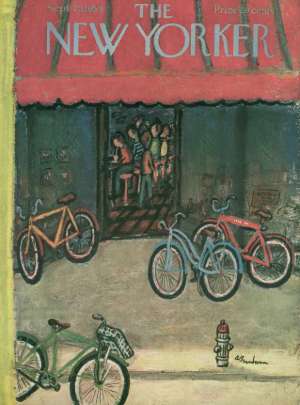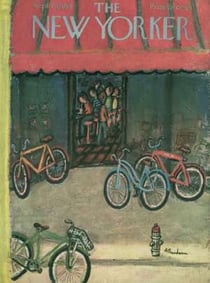The Eye of Edna - #354

Twice a year, in Salem, Massachusetts, Christmas comes. It doesn't come for everyone: only for book people. These lucky few find Christmas in the Senior Center at the Salem Book Swap. (Longtime readers may recall my 2022 reference to this lovely event.)
I got my usual stack of unnoticed things by notable authors and notable things by unknown authors. My hit rate is pretty good as I've only chucked two of the books so collected half-read into the trash. I was delighted to snag the collected Essays of E. B. White, which contains a bunch of his best, reprinted from the New Yorker, Harper's and further afield. (His earlier collection, The Second Tree from the Corner, highlighted my tropical vacation this Spring.) White is a timeless voice, although his opining on the jet age and the car age reads in sepia.
To give you a sense of how he reads and why I treasure him, here are two choice quotes from the introduction to the book. In 1961, E. B. White wrote in a statement for the New York Times, "All that I ever hope to say in books is that I love the world. I guess you can find it in there, if you dig around." And, in a letter:
I discovered a long time ago, that writing of the small things of the day, the trivial matters of the hearth, the inconsequential but near things of this living, was the only kind of creative work which I could accomplish with any sanctity or grace.
He did love the world and his expressions of that love are a gift. All the little live things, to quote the Stegner line, are amplified by E. B. White having noticed them. They are near only to someone with a curious and introspective gaze. After reading an essay of his, you move a little slower, noticing these small things. I am not sure there's a better gift than this sense of wonder.
The fifth essay in the book is The Eye of Edna, about White's experience of the 1954 hurricane. He takes his familiar themes: nature, his Maine farmstead, and the silliness of modernity. It's a classic. The impending and experienced hurricane gives it an air of doom, but he's as funny as ever:
I heard about Edna during the morning of Friday, September 10, some thirty-six hours before Edna arrived, and my reaction was normal. I simply buttoned up the joint and sat down to wait.
As he waits for the hurricane, White continues to listen to the radio, where he heard about the storm in the first place. If Edna is the first character in this little scene, the radio is the second. As he waits for the storm, he begins to note the broadcasters's approach to it. They need the storm's intensity to drive their "news":
During the morning hours, they were having a tough time keeping Edna going at the velocity demanded of emergency broadcasting.
Later, in an interview with the "man on the scene" in Long Island, White believes he hears the radio host wishing for a severe hurricane. His place buttoned up (most of the action in the story is White getting up to check again), he gets to thinking about radio's role in this drama:
... another effect of the radio is to work people up to an incredible state of alarm many hours in advance of the blow, while they are still fanned by the mildest zephyrs.
As the hurricane mostly doesn't make landfall, he keeps thinking that the breathless panic and fomenting of alarm from the radio isn't quite right:
At noon, I took a short vacation from the radio and looked out at the familiar scene, which, because it bore so little relation to the radio scene, assumed a sort of unreality.
The piece continues along these lines: the radio vs. reality. In the end, just after the big city broadcasts declare the hurricane over, Edna makes landfall in Eastern Maine, cutting his electricity, blowing shingles off the house, and felling a giant tree along the path to his well.
In the end, White wonders which was more real: the radio's dire predictions and resulting concern or the storm's actual destruction.
Reading
The Eye of EdnaThe radio either lets Nature alone or gives her the full treatment, as it did at the approach of the storm. The idea, of course, is that the radio shall perform a public service by warning people of a storm that might prove fatal; and this the radio certainly does. But another effect of the radio is to work people up to an incredible state of alarm many hours in advance of the blow, while they are still fanned by the mildest zephyrs. |
|
